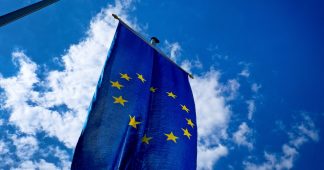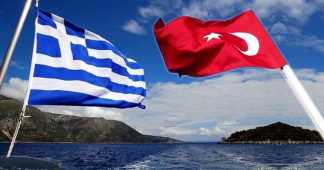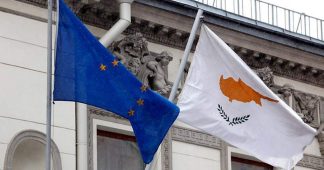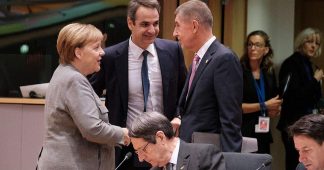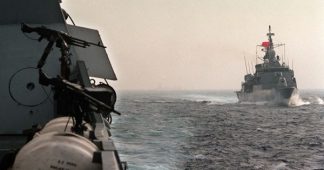By October 26, 2020
Former Greek ambassador Leonidas Chrysanthopoulos provides an update on the EU’s policy towards Turkey, which continues to make hostile incursions into Greek and Cypriot waters. The EU has spent over a year issuing warnings to Turkey, but fails to back them up with concrete measures. With certain member states, notably Germany, prioritising their arms sales to Turkey above the territorial integrity of Greece and Cyprus, ‘European solidarity’ is sadly lacking.
Last month, I informed CIB readers about the EU’s unwillingness to take measures to defend two of its member states, Greece and Cyprus, against hostile incursions into their territorial waters by Turkey. I pointed out the EU’s hypocrisy in having tougher sanctions against Russia – which is not violating the territorial integrity of any EU member – than it does against Turkey, which has been violating the territorial integrity of two member states for well over a year. I stated that Greece and Cyrus must play hardball in upcoming European Council meetings, and refuse to approve proposed sanctions against other countries if a tougher stance were not taken against Turkey. So, did they enjoy any success?
Originally, the European Council meeting scheduled for 24-25 September only had one item on the agenda: relations between the EU and Turkey. But the meeting was postponed until October on the pretext that someone in European Council President Charles Michel’s Cabinet had tested positive for coronavirus.
Of course, the Council could quite easily have convened via teleconference, as it had done during the summer. The real reason for the delay was that the EU was trying to avoid imposing sanctions on Turkey, by giving time to Greece and Turkey to begin exploratory talks, and to the latter to stop their violations of Greek and Cypriot territorial waters.
By the time the Council actually convened at the start of October, more items had been piled onto the agenda: China, Belarus, the conflict in Nagorno-Karabach, and the Navalny assassination attempt. It is hard to avoid the suspicion that this was done to reduce the time for discussions on Turkey.
A faux robust response
Greece and Cyprus waged a gallant battle in Brussels by threatening to block sanctions against Belarus if sanctions against Turkey were not also imposed, and by rejecting draft conclusion proposals submitted by the President of the European Council. The final text generally satisfied Athens and Nicosia as perhaps the best they could hope for in the impotent institutional environment of the European Council.
The conclusions gave the appearance of committing the European Council to a robust future response:
“[T]he European Council strongly condemns violations of the sovereign rights of the Republic of Cyprus which must stop. The European Council calls on Turkey to abstain from similar actions in the future, in breach of international law.” (para. 17)
“in case of renewed unilateral actions or provocations in breach of international law, the EU will use all the instruments and options at its disposal in order to defend its interests and those of its Member States.” (para. 20)
Yet these two paragraphs are defective, since they ask Turkey to stop violations at some unspecified point “in the future”, while those same violations are still happening in the present. At the very moment that these paragraphs were being negotiated, Turkey was violating the continental shelf and the territorial waters of the Republic of Cyprus by a research ship exploring for gas – just as it has been doing for months. So, logically, the measures mentioned in paragraph 20 should have been adopted at that very moment, without further delay.
The latest in a long line of toothless warnings
It is important to remember that this is not the first time the European Council has issued warnings to Turkey about its incursions into Greek and Cypriot waters. For example, its conclusions of 20 June 2019, the Council stated that it:
“expresses serious concern over Turkey’s current illegal drilling activities in the Eastern Mediterranean and deplores that Turkey has not yet responded to the EU’s repeated calls to cease such activities. The European Council underlines the serious immediate negative impact that such illegal actions have across the range of EU-Turkey relations. The European Council calls on Turkey to show restraint, respect the sovereign rights of Cyprus and retrain from any such actions. The European Council endorses the invitation to the Commission and to the EEAS to submit options for appropriate measures without delay, including targeted measures.” (para. 17)
Only after seven months were targeted measures adopted against the CEO of TPAO (the Turkish Petroleum Company conducting the drilling) and one director of the company.
The European Council’s latest warning demonstrates the impotence of the EU, giving Turkey yet another chance to avoid restrictive measures, in the full knowledge that Turkey has been continuing its illegal activities for one-and-a-half years already. Turkey does so precisely because the EU does not take serious action against it. And the lack of effective action is due to the financial bilateral interests of certain Member States – notably Germany, whose biggest arms exports market is Turkey. The EU cannot see that these bilateral interests are actually undermining the effectiveness of the EU.
Turkey remains defiant
A small glimpse into the future can be seen by the reaction of Turkey to the conclusions of the European Council. The Turkish Ministry of Foreign Affairs issued a press release the next day rejecting the conclusions: “Conclusions adopted at the Special European Council Meeting yesterday, regarding Turkey, even with certain positive elements, are far from reality in most aspects.”
The press release even explicitly states that the “Turkish Cypriot side will continue its hydrocarbon activities through Turkish Petroleum,” meaning that Turkey will not stop violating Greek and Cypriot waters. As far as the exploratory talks with Greece are concerned, it claims that, “these talks are aimed to the resolution of all outstanding issues between Turkey and Greece and are not limited to delimitation of maritime jurisdiction areas”, thus effectively undermining the exploratory talks.
Objectively, it can be said that Greece and Cyprus achieved as much as they could in the strange environment of the European Council. These two countries must now bilaterally try to convince other Member States to stop the sale of arms to Turkey as a minimum token of solidarity that is so easily expressed on paper.
Turkey has continued its provocative actions and rejected the European Council’s conclusions. The issue was raised again by Greece and Cyprus at the meeting of the European Council of 15 October, which once again refused to take any action against Turkey. Greece has asked for the Customs Union with Turkey to be suspended, and sent letters to Germany, Italy, Spain and Hungary asking them to stop exports of arms to Turkey.
Many people in Greece are now asking why Greece should belong to the EU which is incapable of protecting its Member States from outside aggression. Once again, the EU has shied away from action, in order to guarantee the economic interests of certain Member States. It has thereby failed to safeguard the sovereign rights of two of its Members, thus adding another pebble to its future dissolution. Could this be the beginning of a Grexit? Time will tell.
But at least there is one point on which Greeks and Cypriots can agree with Turkish president Erdogan: that the EU is an ineffective organisation.
Published at https://campaignforanindependentbritain.org.uk/turkish-defiance-exposes-eu-impotence/
